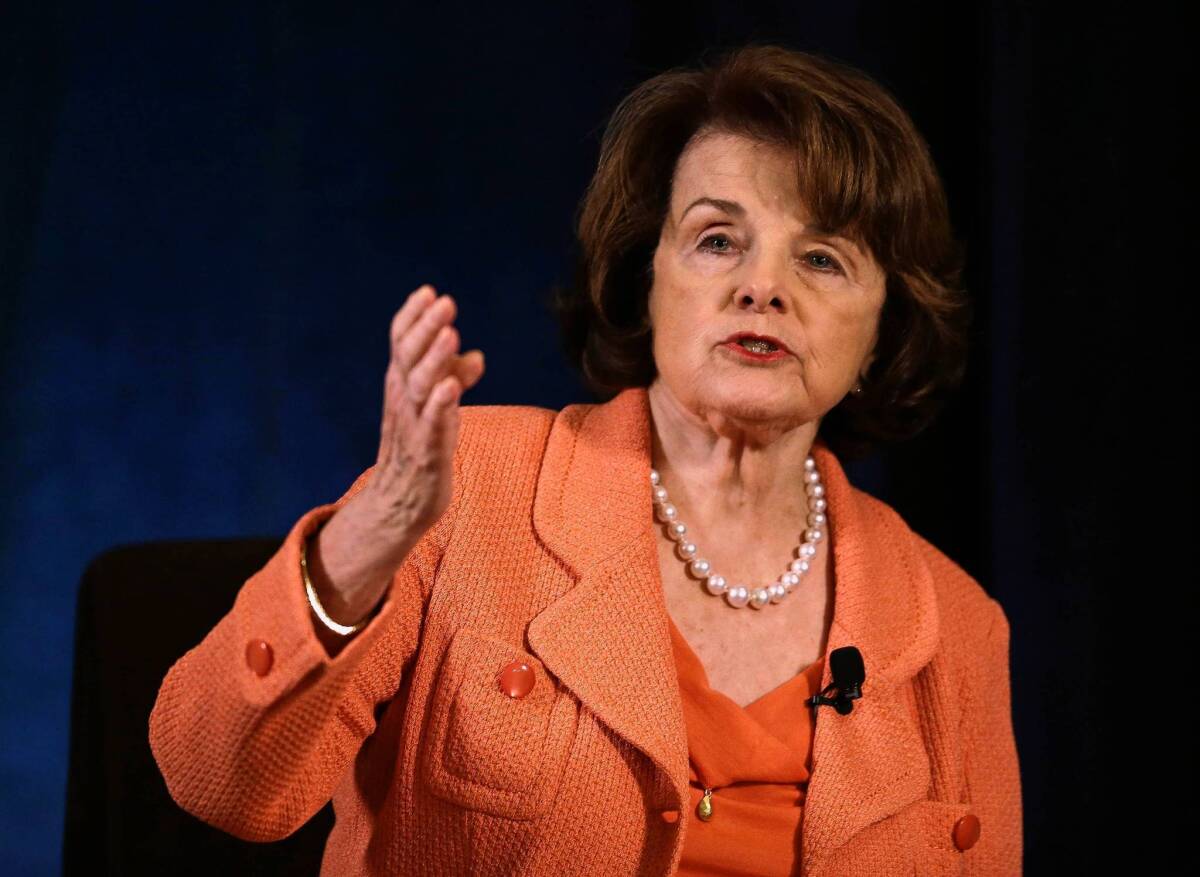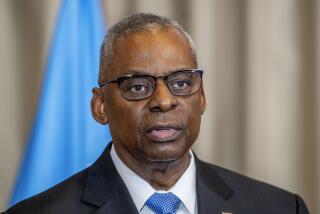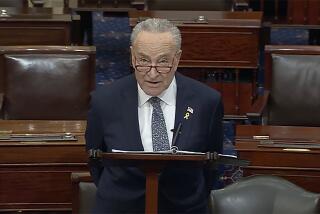Congress speaks with a loud, muddled voice on Syria

WASHINGTON — Sen. Dianne Feinstein made headlines recently by demanding a forceful U.S. response to Syria’s use of chemical weapons against its population.
Less noticed was that the California Democrat wasn’t urging deeper military involvement or other dramatic steps, but only a new push for action by the United Nations Security Council, which has already rejected Western-backed resolutions on Syria three times.
In this cautious approach, Feinstein, who is chairwoman of the Senate Intelligence Committee, is not alone. Several senior lawmakers have been clamoring for stronger U.S. leadership, yet not taking the political risk of calling for any fundamental change in the current course.
Distressed by the suffering in Syria, but wary of another Mideast war, some lawmakers are speaking loudly and carrying a small stick.
Sen. James M. Inhofe of Oklahoma, ranking GOP member of Senate Armed Services Committee, has condemned President Obama for “inaction” but cautions against risky military steps, and he has not outlined a specific alternative.
Rep. Ed Royce (R-Fullerton), chairman of the House Foreign Affairs Committee, has called for the administration to “green light” allies to arm moderate rebel groups, a step the White House took months ago.
“It’s striking how many people are making vehement calls for action that, below the surface, don’t look like much,” said Christopher Preble, foreign policy director at the libertarian Cato Institute.
Although “nobody in Washington wants to appear to be doing nothing,” he said, they understand that the options are poor.
The Pentagon has warned the lawmakers that arms supplied to the rebels could fall into the hands of extremist fighters. And destroying Syria’s extensive air defenses to create a “no-fly” zone to protect rebels and civilians is a big task that could escalate the war without fully protecting civilians or tipping the balance against the government in Damascus.
Yet no politician in Washington wants to appear unsympathetic to Syrian suffering, indifferent to the need for strong U.S. leadership or tepid in support of Israel, an ally threatened by the civil war in its neighboring country.
In a city with a bias for action, it is the advocates of military involvement, such as Sen. John McCain (R-Ariz.), as well as pro-intervention commentators and think-tank experts who have been the focus of most public attention on the issue.
McCain and Sen. Carl Levin (D-Mich.), chairman of the Senate Armed Services Committee, have been pushing to create “no-fly” zones. Sen. Lindsey Graham (R-S.C.) has gone a step further, arguing for U.S. ground troops.
Yet lawmakers also recognize that the public remains stubbornly against U.S. military involvement by about 2 to 1, even as the Syrian death toll, estimated to be more than 70,000, mounts.
In this setting, the pressure on Obama from the American public is to avoid U.S. involvement in war in a Muslim country for the fourth time in a decade. But demands that he find a solution, usually unspecified, are growing on both ends of the political spectrum.
“There’s a pincer movement from left and right that’s squeezing Obama,” said Jim Manley, former top aide to Senate Majority Leader Harry Reid (D-Nev.). “Right now it’s on the level of rhetoric versus demands for concrete action, because there’s no good answers. But people are looking to him for the solution.”
Few lawmakers are publicly calling for the United States to keep clear of the war.
When Secretary of State John F. Kerry appeared before the Senate Foreign Affairs Committee and House Foreign Affairs Committee last month, he was peppered with questions about what more the United States could do. No one urged Kerry to leave the issue to other governments.
Yet many who are calling for action are focusing on the narrow band of choices that the administration is considering.
Sen. Robert Menendez (D-N.J.), chairman of the Senate Foreign Relations Committee, has been an outspoken advocate for arming the rebels and for more forceful action.
But legislation that Menendez unveiled last week stuck close to what the administration had done or was considering. It calls for humanitarian aid to the rebels, which the U.S. is already providing, and authorization for supplying “limited” arms that wouldn’t include the antiaircraft weapons the fighters have demanded.
Sen. Bob Corker (R-Tenn.), the ranking minority member of the Senate Foreign Relations Committee who had been urging restraint on Syria, shifted position last month by saying he favored the United States arming moderate opposition groups.
But Corker said in an interview that he viewed that move — which Obama is considering — as primarily a way to defuse tension with moderate rebel allies, who’ve been angry that the United States hasn’t been providing them arms while some Persian Gulf nations have.
And he said he was not ready yet to support giving the rebels more than the small arms they’re already receiving elsewhere.
Corker said the main U.S. emphasis should be on starting negotiations and using diplomacy to head off a potential war between extremist and moderate rebels, goals he thinks Kerry shares.
“Arming the rebels has become almost just symbolic,” he said.
More to Read
Start your day right
Sign up for Essential California for news, features and recommendations from the L.A. Times and beyond in your inbox six days a week.
You may occasionally receive promotional content from the Los Angeles Times.







